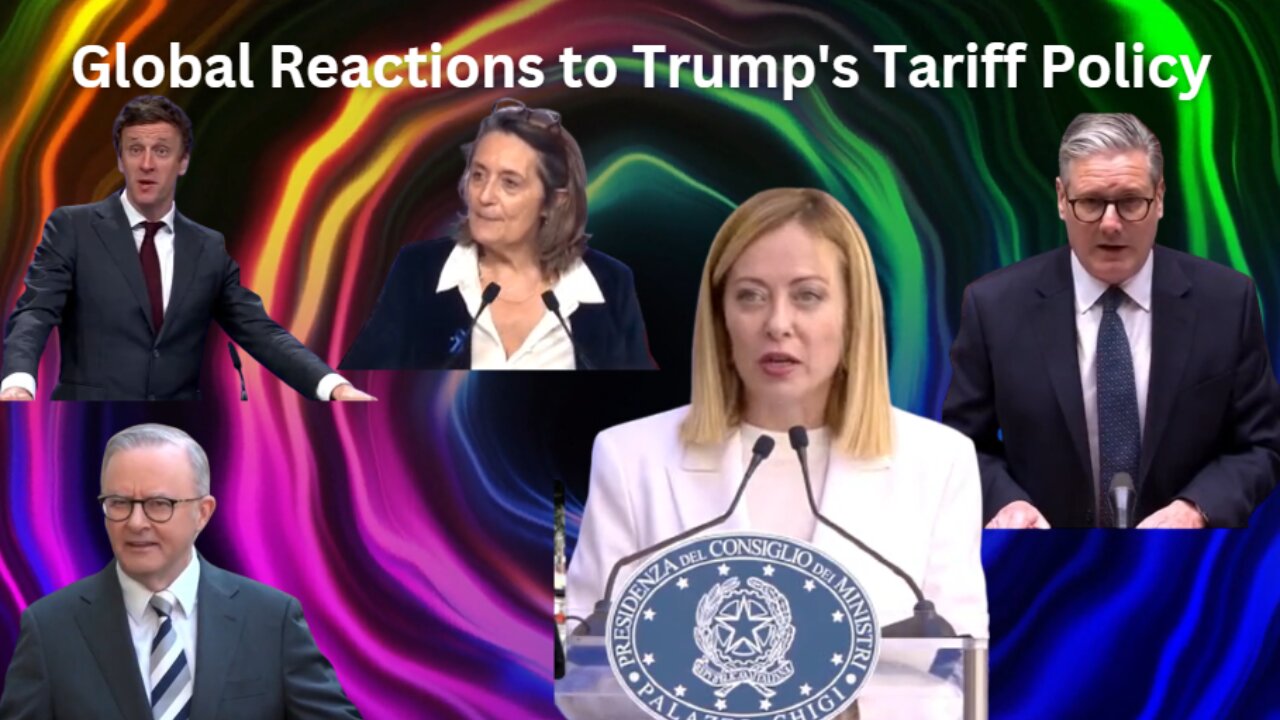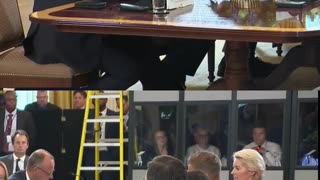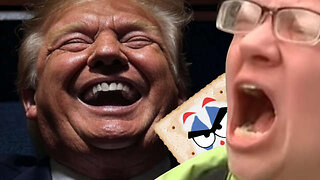Premium Only Content

Global Reactions to Trump's Tariff Policy
Global Reactions to Trump's Tariff Policy
U.S. President Donald Trump has announced a 10% general tariff on all imports to the United States, with higher rates targeting key trade partners. This move has sparked strong reactions from leaders and governments across the world. While Canada and Mexico are exempt from the new 10% tariff, existing tariffs of up to 25% remain on various goods from these countries due to concerns over border security and fentanyl trafficking, according to a White House statement.
International Responses
European Union
European Commission President Ursula von der Leyen criticized the policy, stating it poses a serious threat to the global economy. She warned that the uncertainty it creates would escalate protectionist measures worldwide and have severe economic repercussions. The EU, she noted, is preparing retaliatory actions, particularly in response to U.S. tariffs on steel.
China
The Chinese Ministry of Commerce condemned the tariffs, pledging to take countermeasures to protect its interests. Chinese officials urged the U.S. to remove these unilateral trade restrictions, emphasizing that trade wars yield no winners.
Japan
Prime Minister Shigeru Ishiba expressed deep concerns about the impact of U.S. trade restrictions, noting potential harm to both bilateral and global trade. He also questioned whether the tariffs align with WTO and Japan-U.S. trade agreements.
Canada
Prime Minister Mark Carney acknowledged that key trade aspects between the U.S. and Canada remain intact but criticized ongoing tariffs on steel, aluminum, and fentanyl-related goods. He vowed to implement countermeasures to protect Canadian workers and ensure economic stability.
United Kingdom
Prime Minister Keir Starmer emphasized the importance of fair trade and ongoing negotiations with the U.S. while asserting that any trade agreement must align with national interests. Business Minister Jonathan Reynolds echoed concerns about the negative impact on global trade, affirming the UK’s right to respond if necessary.
Germany
Finance Minister Joerg Kukies called for a firm response from the European Union, warning against passivity in the face of these trade measures.
Brazil
The Brazilian Foreign Ministry expressed disappointment with the U.S. decision, signaling that it would consider all available options, including a potential appeal to the WTO.
Australia
Prime Minister Anthony Albanese criticized the tariffs as illogical and detrimental to U.S.-Australia relations. He warned that such policies would create economic uncertainty and drive up costs for American consumers.
South Korea
Acting President Han Duck-soo highlighted the urgency of addressing the growing trade conflict, urging government action to mitigate economic disruptions.
New Zealand
Trade Minister Todd McClay reaffirmed New Zealand’s commitment to free trade and vowed to engage in discussions with the U.S. administration to assess the impact of the tariffs.
Spain
Prime Minister Pedro Sánchez reassured that Spain would take necessary steps to safeguard its industries and uphold open trade principles.
Sweden
Prime Minister Ulf Kristersson voiced opposition to rising trade barriers, advocating for renewed cooperation with the U.S. rather than escalating economic tensions.
Switzerland
President Karin Keller-Sutter stated that Swiss authorities would evaluate their next steps, emphasizing the importance of economic stability and adherence to international trade rules.
Ireland
Prime Minister Micheál Martin condemned the 20% tariff imposed on EU imports, calling it an unfortunate decision that could harm jobs and economies across Europe.
Italy
Prime Minister Giorgia Meloni underscored the importance of finding a resolution with the U.S. to prevent a trade war that could weaken Western economies in favor of global competitors.
European Parliament
Manfred Weber, President of the European People's Party, criticized the tariffs as a misguided approach that threatens fair trade. He reaffirmed Europe’s unity in protecting its economic interests while remaining open to dialogue.
Colombia
President Gustavo Petro stated that tariffs would only be increased if U.S. trade policies harmed Colombian jobs, emphasizing the importance of fostering economic opportunities.
Conclusion
As Trump's tariff policy unfolds, it has drawn widespread criticism and concern from leaders worldwide. Many governments are weighing their responses, with several preparing retaliatory measures or seeking diplomatic solutions to mitigate the impact on global trade.
-
 1:58
1:58
News World Around – Stay Updated with Global News
11 days agoTrump Proposes Meeting of Putin & Zelensky
1 -
 LIVE
LIVE
StuffCentral
3 hours agoI'm baaack (no you can't play with me.. unless you a healer)
92 watching -
 2:25:11
2:25:11
TheSaltyCracker
4 hours agoTrump Is Not Dead ReEEeStream 8-31-25
60.8K93 -
 LIVE
LIVE
THOUGHTCAST With Jeff D.
2 hours agoLabor Day Weekend FORTNITE With THOUGHTCAST Jeff & the squad
165 watching -
 3:44:05
3:44:05
Rallied
5 hours ago $0.26 earnedSolo Challenges All Day
34.7K1 -
 LIVE
LIVE
iCheapshot
5 hours ago $0.03 earnedCall of Duty: Black Ops Campaign
44 watching -
 4:39:16
4:39:16
Meisters of Madness
6 hours agoMadness in a Pod
5.18K1 -
 1:25:44
1:25:44
HELMETFIRE
3 hours ago🟢GAMING WITH FIRE EP9🟢
5.9K -
 1:24:08
1:24:08
Jean-Claude@BeyondMystic
14 hours ago🌀 THE WACKY WOO SHOW 3I ATLAS ALIEN INVASION with DICK ALLGIRE & JC - AUG 31 , 20254
42.8K57 -
 2:26:21
2:26:21
vivafrei
13 hours agoEp. 279: Patel's GF Sues for Defamation! Rogue Judges vs. Trump! Raja Jackson, Kick Stream & MORE!
140K81